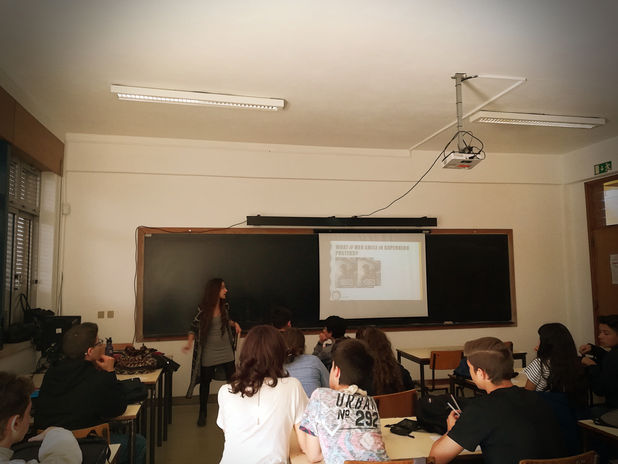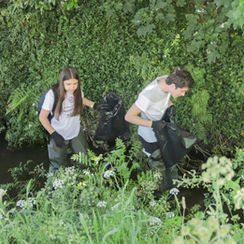Conference cycle in Serralves
Last session
On the ninth of May, our collaborative project with the High School of Valongo “A world without plastics” was presented at the international conference Uma Nova Utopia Europeia at the Serralves Museum of Modern Art in Porto. As a part of our larger program “Valongo, Cidade Utópica”, students of our partner school presented creative talks on plastic pollution and the use of plastic items more generally. Their talks were preceded by a short movie created by our team that was composed of clips from a plogging event in Valongo framed by short notes about the impact of global plastic pollution. Not only was the original event a remarkable success, bringing together out trainees and almost 100 students for feasible anti-pollution activism, but the cinematic recollection offered a fresh interlude into the academic contributions of the international presenters.
Plogging in Serra de Valongo
On Friday 3rd of May 2019, we took an active part in cleaning the environment with an event called „Plogging“. Plogging is a combination of the words jogging + plockaupp which basically means “picking up the trash while jogging through the nature“. The destination we chose was Serra de Valongo park because it`s noted to have some rubbish in the area. The team was made of about 100 students from the 8th to 12th grade in the Secondary school of Valongo. The event took three hours and resulted in the collection of nine bags full of trash, mostly plastic. This event showed how much trash can be collected in an area of 5km, exemplifying the need of action and spreading awerness of environmental sustaintability.
WORKSHOP
Ecological footprint; how many planets do we need if everybody lives like you?
On the 1st of April, the Utopia 500 team presented a workshop at the “Escola Básica do Campo”, titled: “Ecological footprint; how many planets do we need if everybody lives like you?”. The same workshop took place in "Escola Secundária de Valongo" on the 3rd of May, followed by a plogging event in Serra de Valongo.
The aim of our workshop -addressed to 8th, 9th, 10th and 12th grade students- was to increase student´ awareness about the impact that humans’ activities have on the environment, giving them some suggestions to reduce their personal impact and become “greener”. At the same time, we tried to share the idea that if we need to achieve sustainability, we have to be more active as citizens. It is not too late, we can still help our wonderful planet.
The presentation included some theoretical explanation regarding the notion of ecological footprint, carbon footprint, climate change and global warming; interactive activities such as the ecological footprint calculator and a quiz-game and discussions about some consequences that our daily activities have on the environment.
Escola Básica do Campo
WORKSHOP
Sustainability and the Serra de Valongo
On 27th and 28th of February, 7th and 8th of March 2019, the Utopia 500 team promoted workshops in different elementary schools of Valongo (EB 1 de Campelo, EB de Fijós, EB da Balsa and EB de Paço). The workshop was entitled “Ecotopia: Sustainability and the Serra de Valongo” and its main objective was to promote the Serra de Valongo and the Parque das Serras do Porto. The first part of the workshop consisted in the viewing of the film 'The Lorax', an animation film that shows the extinction of nature, thus creating a new world where everything is artificial (even the trees), the air is purchased and there is no sunlight.
After the film, we made a presentation that consisted of three parts: first, we asked three questions about the film to see if the children easily understood the main themes; second, we explained what the Serra de Valongo range is and the different ecosystems with their respective animals. Finally, we had a practical part where each child would paint an animal of the Serra de Valongo and then paste the animals to a class poster.
In this workshop, children were able to learn more about the Serra de Valongo and how important it is to protect it. This was done through interactive activities in which they had the opportunity to learn while having fun.

WORKSHOP
GENDER EQUALITY AND SUSTAINABLE DEVELOPMENT
On 12th, 25th, 29th and 30th of October 2018, the team from Ecotopia subproject conducted several workshops in the Secondary School of Valongo about “Gender Equality and Sustainable Development”. The workshops were carried out by Deniz Ozdemir and Aylin Talas. The aim was raising awareness about gender and gender equality, promoting concepts which are related to sustainability in both ecological and social approaches and bridging the idea of how gender equality is necessary for sustainable development. The presentation included some physical activities, interactive lectures and discussions. The statistics and graphs that were shown were taken from United Nations’ database. Students were informed about United Nations’ Sustainability Goals.
The workshops were completed with 8th, 9th, 10th, 11th and 12th grade students from Secondary School of Valongo. Students’ ideas about introductory gender concepts and stereotypes were collected in order to create a comparative discussion environment.

Repara em Valongo

On May 23rd, we began our three-day festival in Valongo, Repara em Valongo. For the first two days, we had eight stands set up at Largo do Centenário with different schools and organizations at each stand. The purpose was for these individuals to share their skills with the public in hopes of emphasizing the importance of upcycling.
On Thursday and Friday, we had several stands offering a large variety of services to the public. The first was Escola Profissional de Turismo de Valongo. This group offered several tours of Valongo throughout the day as well as discussing their program.
The second stand was Centro Social de Ermesinde, a group of volunteers who upcycle furniture, turn small items into toys or everyday household objects, and, currently, they are working on renovating a van. One of the furniture pieces that they sanded, painted, and reupholstered was a chair; found on the side of the road and headed for the dump. They continued to explain that they give new life to more things than just furniture. They made several different games like a foosball table made from a wooden fruit crate, tic-tac-toe from bottle caps, and dominoes from popsicle sticks. Along with the upcycled furniture, the volunteers brought a van that they plan to fix up and, on the second day of the festival, two women arrived to teach the community how to sew and mend their own clothes. These women volunteer their time to the organization and hold workshops for their community to attend. For the van, there were three renovation ideas that the public could vote on: a camper, workshop, or city tour van.
The volunteers also have a few outreach programs for their community. One of them was a system that allowed people in their community to rent tools for one Euro apiece.
The third stand was staffed by groups of schools that offered Professional Culinary courses and Professional Restaurateur courses. The students offered to discuss the skills they have learned in their programs as well as the food they brought. They had a range of items to try from pastries to juice, but their key item was three types of juices made from ingredients such as orange peels, onions, and ginger. The small pasties and snacks were made from food found in a pantry. They wanted to educate the community about food waste and consumption by showing people how to incorporate the food we think of as “waste” into our regular diet.
The last three stands were staffed by schools that offered courses in the fields of computing, programmino and network management installation. The students from the schools in Valongo offered the community their skills with old electronic equipment. They have learned how to reuse old electronics to construct and reconstruct new computers. These students also fixed laptop and phone chargers for anyone who brought them. The students from Campo, Valongo also worked with computers, but they discussed the introduction of a new course: installment and management of networks, providing a more complete range of skills for the students. On display, the students had a 3D printer for demonstration purposes and showed off their robots to the community with one being a little dog that barked and walked and the other a drone. The drone was a work in progress, but the students wanted to display an example of the work done within their programs. The schools from Alfena discussed their technical courses and informatics equipment with the community and offered to fix any electronic equipment brought to them.
During the first two days of the festival, we hosted five speakers who presented in the Auditorium of the Freguesia de Valongo on a range of topics. On Thursday, Helder Filipe, from LIPOR and Project CREW, gave a presentation on electronics, “The Effects of Electronic Equipment and what Electronics can do for the Community” and Telmo Machado, also from LIPOR and Young Professional’s Group, explained the importance of young professionals in his presentation, “The future of work: The Role of Young Professionals in Society and the Treatment of Residue.” On Friday, we hosted our last presenters: Sérgio Garcia, from the Social Center of Ermesinde and Raquel Gaspar and Prof. Ana Clara Madeira, both from FEUP - Faculty of Engineering at the university of Porto.
Sérgio Garcia gave the first seminar, “Circular Economy: Why in the Social Center of Ermesinde”. The last presentation was a discussion on how schools could work towards becoming more sustainable, “How to Contribute Towards a More Sustainable School”, given by Raquel Gaspar and Prof. Ana Clara Madeira.
On Saturday May 25th, the last day of the festival, we held our second Plogging event at Corredor Ecológico of the Serra de Valongo. For two hours, we picked up rubbish found along the walking path with items ranging from small to large such as candy wrappers and plastic toys. This, overall, was a very successful event. In total, we had 136 volunteers working at the stalls, 124 participants at the seminars and, every person who attended, learned something new. From furniture to electronics, people of all ages were welcomed to learn a new skill or, simply, to sit and talk with the students about their programs. No matter how small, the skills and ideas that we shared with one another brought us one step closer to creating a better world.


















































































































































